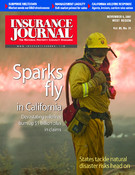After the terrorist attacks of Sept. 11, 2001, the market for commercial property and liability insurance in large urban areas was in turmoil, as reinsurance for terrorism became expensive and scarce. Congress responded in 2002 with a federal backstop — the Terrorism Risk Insurance Act (TRIA) — to compensate commercial insurers for large, foreign-inspired conventional terrorism losses.
The original program helped stabilize the economy and addressed the availability of coverage for terrorist attacks using conventional weapons, as well as coverage for both conventional and nuclear, biological, chemical and radiological (NBCR) terrorism in workers’ compensation policies. In 2005, Congress extended TRIA for two more years, but it is set to expire Dec. 31, 2007.
The Property Casualty Insurers Association of America supports a long-term extension of TRIA, which has successfully protected millions of individuals, businesses and the U.S. economy since its implementation in January 2003. We believe a long-term TRIA program is needed to ensure that a stable and competitive market for terrorism insurance remains intact.
A bill (H.R. 2761) to extend this critical public/private partnership recently passed the U.S. House of Representatives by an overwhelming bipartisan majority, 312 to 110. The legislation has moved on to the U.S. Senate, which must either vote on this bill, or pass an alternative, before Dec. 31 to prevent this crucial program from expiring.
H.R. 2761 would extend the program through Dec. 31, 2022, providing long-term stability for policyholders and financial markets. Coverage would include most commercial property and casualty lines, including workers’ compensation and farm owners’ multi-peril, a provision PCI worked hard to have included as an amendment to the bill.
PCI supports many of the provisions of H.R. 2761. We believe that a reduced trigger level (the threshold at which the program would kick in) and the elimination of the distinction between foreign and domestic terrorist attacks will enhance the terrorism insurance market and allow more insurers to provide this important coverage to more businesses and the workers they employ. Several other parts of the bill, including a long-term extension and a “reset” provision helping areas previously attacked, would also strengthen the program considerably.
The bill clearly has many positive provisions that will benefit not only consumers, but the entire U.S. economy as well by enabling continued commercial lending and building where lenders may well be hesitant to make loans without readily available and affordable terrorism insurance.
However, the bill’s mandate that insurers be required to make available coverage for attacks using weapons of mass destruction will undermine the very foundation of the program, threaten the solvency of many insurers, and leave many commercial consumers with fewer choices and higher premiums. It is also an unnecessary program expansion. Expansion of the program is the chief driver behind a Bush Administration Statement of Administration Policy (SAP) threatening a veto of the bill as written in the House.
The existing program — which does not have a mandatory make-available requirement for NBCR attacks — has had the extremely beneficial effect of transforming an uninsurable risk into an insurable one. Thanks to TRIA, 60 percent of U.S. businesses — of all types and sizes in all parts of the country — can purchase affordable terrorism insurance at lower prices. This financial protection benefits individual businesses, the workers they employ, and the U.S. economy.
H.R. 2761’s mandate that insurers be required to make NBCR coverage available would undermine TRIA’s goals by reducing competition, raising prices and lowering take-up rates for terrorism insurance. With potential losses from such an attack, as estimated by the American Academy of Actuaries, as high as $778 billion, and even with a reduced deductible, it is virtually impossible to price coverage for NBCR losses because historical claims data are nonexistent.
If NBCR coverage were to be required of insurers selling terrorism policies, there would be a variety of negative consequences, including increased insurer surplus at risk; increased insurance prices; less participation in the program, leading to less competition and spreading of risk; and significant operational issues for insurers who are not equipped to adjust claims in areas hit by an NBCR attack.
It is important to note that not only PCI, nor insurers in general, have warned of negative consequences to a mandatory NBCR coverage provision. A number of well-respected public and private agencies — including the Financial Services Roundtable, the Government Accountability Office (GAO), the President’s Working Group on Financial Markets, the Risk and Insurance Management Society (RIMS) and the RAND Corp. — have studied the issue extensively and arrived at similar conclusions.
Because there are many positive aspects to the legislation, PCI hopes that the final bill produced by Congress will remove the mandatory NBCR coverage provision. It would be unfortunate for a good bill to be derailed by an unworkable requirement that the industry insure against an uninsurable threat.
Was this article valuable?
Here are more articles you may enjoy.


 AIG’s Zaffino: Outcomes From AI Use Went From ‘Aspirational’ to ‘Beyond Expectations’
AIG’s Zaffino: Outcomes From AI Use Went From ‘Aspirational’ to ‘Beyond Expectations’  AIG Underwriting Income Up 48% in Q4 on North America Commercial
AIG Underwriting Income Up 48% in Q4 on North America Commercial  A 10-Year Wait for Autonomous Vehicles to Impact Insurers, Says Fitch
A 10-Year Wait for Autonomous Vehicles to Impact Insurers, Says Fitch  Florida Insurance Costs 14.5% Lower Than Without Reforms, Report Finds
Florida Insurance Costs 14.5% Lower Than Without Reforms, Report Finds 


